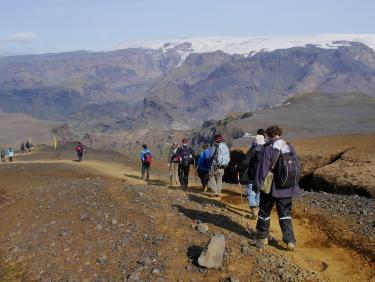Faculty of Chemistry and Earth Sciences Earth Sciences
The objective of Earth Sciences is to understand the creation and development of planet Earth from its beginning to its current complexity. Due to the interactions between the geosphere, atmosphere, hydrosphere and biosphere, the Earth’s surface – and with it, the human habitat – is constantly changing.
Geoscientists study the Earth system in various spatial and temporal dimensions. At the submicroscopic level, Earth Sciences study the smallest structures of rocks, while at a global level, they examine Earth’s huge lithospheric plates. Earth Sciences are characterised by their interest in the dimension of time, from picoseconds – as a measurement of chemical reactions on mineral surfaces – to billions of years – as a measurement of plate tectonics and biological evolution. Earth Sciences have a special social relevance, not only in the early recognition of geohazards, such as volcanic eruptions, earthquakes, or meteorite impacts, but also in the area of current environmental and climate changes. By examining the processes of the geological past, it is possible to make predictions about Earth’s near and distant future. Earth Sciences play a fundamental role in answering questions about the effects that human beings have on the Earth system as well as the resilience of geo-ecosystems, and the availability of geo-resources.

Special Features and Characteristics
Along with traditional Earth Science disciplines, such as Mineralogy, Geology, and Palaeontology, Heidelberg University also offers the disciplines: Environmental Geochemistry, Palaeoenvironmental Dynamics, Cosmochemistry, and Geochronology. The emphasis of the approach is to study processes in a highly precise manner, both qualitatively and quantitatively.
The high level of analytical expertise held by the geoscientific researchers at Heidelberg University is reflected by our national laboratory for secondary ion mass spectrometry as well as numerous other advanced analytical facilities that are utilized for the instruction of laboratory courses or are available for research for final theses.
The interpretation of high precision data is critically determined by the quality of the selection and collection of samples, which is why field exercises and excursions account for a large portion of instruction.
Research
Primary research emphasis is in the following areas:
- Biogeochemistry
- Biostratigraphy and Palaeoecology
- Geochemistry and Cosmochemistry
- Isotope Geology and Petrology
- Mineralogical and Petrological Processes
- Paleontology
- Palynology and Palaeoenvironmental Dynamics
- Physics of Environmental Archives
- Quarternary Ocean Dynamics
- Sedimentology and Palaeoenvironmental Dynamics
- Thermochronology and Archaeometry
Occupational Areas
Professional Opportunities for Geoscientists
- Consulting companies (environmental technology, contaminated sites), engineering companies and architecture firms (site investigation)
- Universities and research institutes
- Materials industry (ceramics, glass, semiconductors, new materials)
- Exploration and raw materials industry (rocks, soils, gold, diamonds, gemstones)
- Energy industry (oil, gas, coal, geothermal energy, water)
- Water management
- Recycling companies
- Public authorities (environmental agencies, state geological offices, German Federal Institute for Geosciences and Natural Resources)
- Monument conservation, museums
Video about the study programme
Studying Earth Sciences at Heidelberg University - why is that a good idea? This film gives an insight into the study of geosciences, the different research areas at the institute and student life in Heidelberg.
Insights

The BA programme in Earth Sciences enables me to understand the complex processes that govern our planet.
Sophie Steffens, 20, Earth Sciences, 5th semester Bachelor



